Sunday, May 18, 2008 6:11 PM CDT
BLOOMINGTON -- Curtis Hawk has 2,400 eyes and ears when it comes to severe weather, and he needs them all.
He has 1,200 weather spotters scattered throughout McLean County, who are especially important during peak tornado season of March, April and May.
“Radar picks up a lot, but the man on the ground is very important,” said Hawk, McLean County Emergency Management Agency (EMA) director.
His agency handles other emergencies as well, such as hazardous material spills, but weather is the most common emergency, Hawk said.
A severe weather watch means the conditions are favorable for bad weather. A warning means severe weather has been spotted.
Ideally, there’s a watch before a warning. “It’s tough if it goes right into a warning,” Hawk said.
Many of the McLean County weather spotters have all-hazard alert radios that alert them to bad weather, Hawk said.
The spotters, he said, volunteer for the same reason as do volunteer firefighters — to protect their community. Spotters come from all walks of life and include everyone from firefighters to State Farm office workers, he said.
Severe weather occupies much of the time of the Emergency Management Agency in Woodford County, where Director Bob Hix said there are between 150 and 200 weather spotters.
His agency relies on the National Weather Service in Lincoln, emergency agencies in other counties and weather spotters. Warning sirens also help: Hix said Roanoke got three new sirens over the past five years and Eureka will get a new one this summer.
The new sirens cost up to $30,000, are louder than the old ones and can be used as a public address system. But Hix said they are no substitute for a weather alert radio because they can’t be heard by everyone inside a well-insulated house with the television on.
“A weather radio is still the answer for most people,” he said. The radios can be purchased for between $50 and $70.
Hix, who runs a one-man office, tries to stay available in case he’s needed. “I don’t make too many trips during the tornado season,” he said.
Florida Hurricane Conference Presents Message of Preparedness
Preparing for hurricanes, despite two slow previous storm seasons, is key to the survival of Floridians and recovery efforts, officials said.
About 2,800 people attended the 22nd Annual Governor's Hurricane Conference on May 14, where the main message was preparedness over complacency.
"Each and every individual citizen has a responsibility,'' Gov. Charlie Crist told a crowd of emergency responders.
Craig Fugate, the state's emergency management chief, said too often we refer to victims after hurricanes when instead we should focus on survivors.
The mentality in the past has always been, "something went wrong, blame somebody else,'' Fugate said.
"It's about being survivors, that's my message,'' Fugate said. "We can accomplish a lot if we include our neighbors, the people down the street. Write them out of your plan, and we're going to fail. It's just that simple.''
Fugate repeated a familiar message: it's not a question of if another hurricane will hit, but when, and the need to be prepared to survive alone for a few days after the storm is more important than ever.
"If we can't do that, everything else we do will fall flat on its face,'' he said.
"If the great Miami hurricane hits today, it will dwarf the cost of Katrina,'' Fugate added, noting estimates put such a disaster cost at more than $160 billion in losses. "The message is simple. We've got to be survivors.''
Earlier in the day, Crist also emphasized the need for citizens to be prepared to help themselves.
"Without our citizens, there's just no way we can help everybody,'' the governor said. "We were very fortunate last year ... but we can't count on that.''
Hurricane season begins June 1 and runs through November.
Later in the day, talk turned briefly to global warming and its potential effect on hurricanes, a debate that has been raging within the scientific community for several years.
Stanley Goldenberg, a meteorologist with the National Oceanic and Atmospheric Administration's Hurricane Research Division, warned that "just because it's published doesn't make it true.''
"This is a hot debate,'' Goldenberg said. "I have never seen anything like it in my career.''
He said "very prominent scientists with tremendous reputations'' have conflicting opinions about whether man-made global warming will have any effect on hurricane strength and frequency.
"The weather is always changing,'' he said, regardless of man's actions, and certainty about man-made climate change and its affect on hurricanes is far from, well, certain.
MARITIME NOTEBad weather for marine insurance
05/19/2008 08:13 PM |
By Frank Kennedy, Special to Gulf News
At the beginning of this year there was a mood of short-term optimism in the marine insurance sector that was summarised by Aon's Annual Marine Insurance Market Review that predicted the industry would experience a continuing run of favourable insurance premiums in 2008, despite facing higher risks.
Moreover, Aon said that the cargo and liability markets would offer a 'win-win' scenario to ship and cargo owners who were paying less and to underwriters who remained in profit due to fewer claims - for the time being, at least.
The expectation was that rates for well-managed risks would continue falling throughout 2008 by up to 10 per cent, due to a plentiful supply of capacity combined with a low claim level creating fierce competition between underwriters.
Furthermore, the relatively benign claims environment was a reflection on major advances in recent years in ship design, cargo handling and general maritime safety.
However, Aon was certainly not as optimistic for both the Protection and Indemnity (P&I) and the Hull and Machinery markets saying the tide was turning for P&I, the clubs having announced big rate increases for 2008 in response to a surge in the size of large claims.
Furthermore in Hull and Machinery, losses were beginning to impact the accounts of many insurers, although not as severely as in P&I. Affirmation of this mixed picture came last week from the UK P&I Club that said the high level of large claims seen in 2006 continued into 2007 except for those related to oil pollution that had been at their lowest for five years.
The Nordic marine insurance association CEFOR is also pessimistic about the overall future of all types of marine insurance following 2007 figures that demonstrated an alarming trend with the average hull claim cost rising 86 per cent over the last five years.
With claims costs likely to continue growing in the future, the association has expressed concern that the industry must take further steps to manage costs without risking safety.
Within different segments of marine insurance, the picture remains distressingly consistent and the members of the International Group of P&I Clubs are currently faced with a considerable increase in costs of their pooling arrangement, covering claims in excess of USD seven million. Indeed, the severities of large claims is showing record highs.
The present situation has been precipitated by several contributory factors, both internal and external to the maritime industry - and on the internal front the issue of manning is very relevant.
For some time now the International Maritime Organisation (IMO) has expressed concern regarding the growing shortage of skilled and experienced seafarers to man a growing and increasingly technological fleet.
Such is the price for a current shipping boom with resources being stretched by demand but this shortcoming is now impacting directly on insurance claims with an alarming indication of increasing human error statistics as significant contributory causes of marine accidents!
Cost increases
Externally, the current rises in costs of raw materials and services have also been a direct cause of price increases for all claims cost factors and the entire scenario has been adversely affected by the weak US dollar, add to this the increasing complexity of environmentally-aware processes of salvage and wreck removal, then cost increases are being further exacerbated.
Such are the forces that will undoubtedly determine the rises in premium prices that are now set to befall the ship operator and with little change expected in the external factors at play it will be incumbent on the industry as a whole to contain the situation as far as it can.
This must be by internal improvement to reduce the number of insurance claims; otherwise the costs may become exponential.
Such a solution is, of course, easier said than done but is symptomatic of the many fundamental flaws that are present within the global industry where the 'good-guys are carrying the bad guys' - this goes for operators, Flag Administrations and classification societies alike. Until management of risk is properly contained across the entire operational spectrum, the costs will be payable in lieu!
Medevac South of Freeport, Texas
HOUSTON - the Coast Guard medevaced a 42-year-old man from an oil tanker approximately 30 miles south of Freeport, Texas, May 8, 2008. Coast Guard Sector Houston-Galveston received a call at 5 a.m. ...
RS








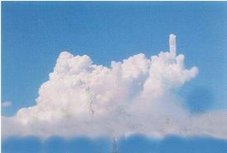
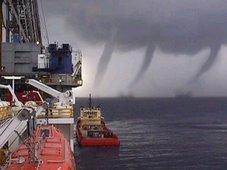
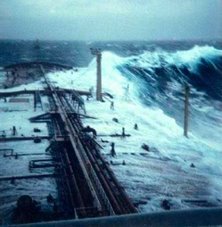
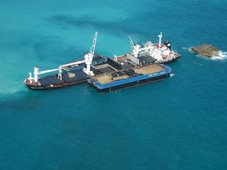
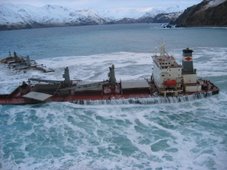
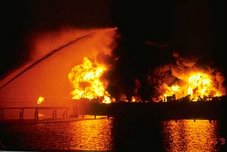
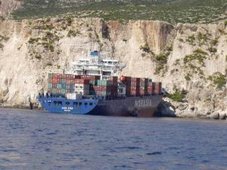
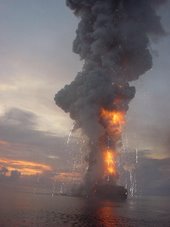

![Validate my RSS feed [Valid RSS]](valid-rss.png)
No comments:
Post a Comment